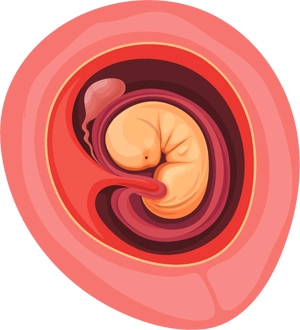In the early stages of pregnancy, which is commonly referred to as the first month, various changes begin to take place within the woman’s body. During this time, a fertilized egg implants itself into the uterus, and the formation of the placenta begins. While the outward signs may not be noticeable yet, the development of crucial structures that support the growing fetus is underway. It’s a critical period that sets the foundation for the subsequent months of pregnancy.
Table of Contents
ToggleWhat are the common symptoms during the 1st month of pregnancy?
In the initial month of pregnancy, women often experience various symptoms:
- Mild cramping
- Light spotting
- Tender or swollen breasts
- Nausea with or without vomiting
- Feeling tired
- Feeling bloated
- Mood swings
- Increased frequency of urination
- Food cravings and aversions
- Missed period
What are the inside and outside changes in the 1st month of pregnancy?
 Embryonic Development
Embryonic Development
In the initial month of pregnancy, known as the first trimester, embryonic development is a remarkable process. Shortly after fertilization, the fertilized egg, or zygote, undergoes multiple cell divisions as it travels down the fallopian tube and implants itself into the uterine lining. This marks the beginning of the embryonic stage.
By the end of the first month, the developing embryo is a tiny structure with three distinct layers: the endoderm, mesoderm, and ectoderm. These layers lay the foundation for the formation of various organs and tissues. The neural tube, which will later develop into the brain and spinal cord, also begins to take shape during this crucial period. As the embryo establishes its place in the uterus, the intricate process of organogenesis is underway, setting the stage for the subsequent stages of pregnancy.
Changes to the Body
In the initial month of pregnancy, changes to the body are subtle but significant. While outward signs might not be apparent, internal transformations are underway. One of the earliest indications is the implantation of the fertilized egg into the uterine lining, a process that can cause mild cramping and spotting.
Hormonal shifts play a key role during this period. The body begins producing human chorionic gonadotropin (hCG), the hormone detected by pregnancy tests. This hormone helps sustain the uterine lining and signals the ovaries to stop releasing eggs.
Some women may experience early signs like breast tenderness, fatigue, or heightened sensitivity to smells. The body is gearing up for the crucial task of nourishing and supporting the developing embryo. While these changes might be subtle, they lay the groundwork for the more noticeable transformations that occur in the subsequent months of pregnancy.
What is the quick list on the 1st month of pregnancy?
The first month of pregnancy involves several important tasks and considerations.
- Take a pregnancy test
- Inform your partner
- Find an obstetrician-gynecologist (ob-gyn) or prenatal care provider
- Schedule your first prenatal checkup
- Start taking prenatal vitamins with folic acid
- Check the health insurance policy
- Financial planning
What are some things to avoid during the 1st month of pregnancy?
During the first month of pregnancy, it’s crucial to be mindful of certain factors to support a healthy and safe gestation.
- Alcohol and Tobacco
- Certain Medications
- Caffeine Overconsumption
- Raw or Undercooked Foods
- Excessive Stress
- Hot Tubs and Saunas
- Intense Physical Activities
- Toxic Substances
Last Updated on January 14, 2024
Written By
With a solid foundation in family dynamics, child development, and a knack for assessing products, our content is built on a strong grasp of our topics. We use trustworthy sources, seek advice from experts, and stay current with the latest happenings in our fields. We always give credit to our sources, reveal any possible conflicts of interest, and deliver info in a truthful and unbiased way. Follow us on Facebook or join our Facebook Group.
Start your journey to confident parenting
Join over 2,000+ parents who receive free practical advice and tips from Joyful PH. Unsubscribe anytime.
You may also like
Third Trimester Pregnancy (28-40 Weeks)
The third trimester of pregnancy, spanning from 28 to 40 weeks, marks the final…
Second Trimester Pregnancy (14-27 Weeks)
The second trimester of pregnancy, spanning from 14 to 27 weeks, is often…
First Trimester Pregnancy (0-13 Weeks)
During the first trimester of pregnancy, spanning from 0 to 13 weeks,…
9 Months Pregnancy
In the ninth and final month of pregnancy, the journey comes to its culmination…
8 Months Pregnancy
In the eighth month of pregnancy, the baby is getting ready for birth, and the…
7 Months Pregnancy
During the seventh month of pregnancy, significant milestones occur. The baby's…







